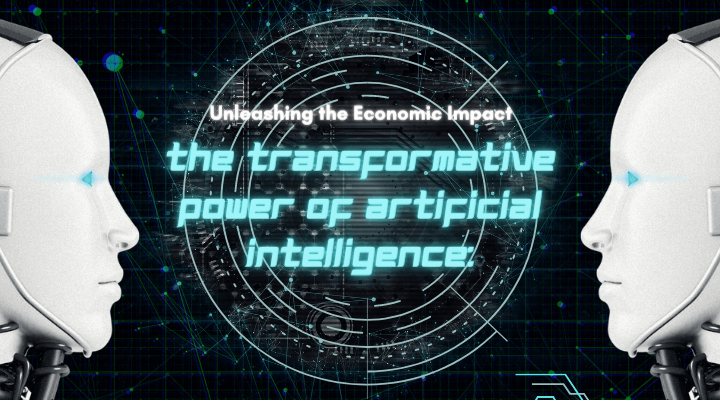The Transformative Power of Artificial Intelligence: Unleashing the Economic Impact
In recent years, artificial intelligence (AI) has emerged as a transformative technology with the potential to reshape industries, revolutionize work processes, and redefine economies. From self-driving cars to voice assistants and personalized recommendations, AI is already deeply ingrained in our daily lives. However, its true economic impact reaches far beyond convenience and efficiency. This article explores the profound influence of AI on the economy, highlighting both the opportunities and challenges it presents.
AI Driving Economic Growth

Artificial intelligence has the power to ignite significant economic growth by driving innovation, increasing productivity, and creating new market opportunities. According to a report by PwC, AI has the potential to contribute up to $15.7 trillion to the global economy by 2030. By automating repetitive tasks and augmenting human capabilities, AI frees up valuable time for employees to focus on more complex, creative, and strategic activities. This enhances productivity and paves the way for economic expansion.
Industry Disruption and Job Transformations

As AI technologies advance, they have the potential to disrupt traditional industries and transform the nature of work. While some jobs may be automated, new roles will emerge, demanding a combination of technical skills, creativity, and adaptability. A study by the World Economic Forum predicts that AI will displace 75 million jobs globally by 2025 but create 133 million new ones. It is crucial to invest in reskilling and upskilling initiatives to equip workers with the necessary skills for the jobs of the future.
AI and the Workforce of Tomorrow

AI has the potential to revolutionize the workforce, enabling greater flexibility, remote work, and work-life balance. Intelligent automation can streamline operations, reduce costs, and improve customer experiences. This transformative impact will extend across industries, from healthcare and finance to manufacturing and transportation. However, it is vital to address ethical concerns and ensure that AI systems are designed to augment human capabilities rather than replace them entirely.
Economic Disparities and Inclusion

As AI becomes more prevalent, it is essential to address the potential for economic disparities and ensure inclusion for all. AI technologies have the power to exacerbate existing inequalities if not implemented thoughtfully. Access to AI tools, data, and infrastructure must be democratized to enable small businesses and developing nations to participate fully in the AI-driven economy. Ethical considerations, fairness, and transparency should be at the core of AI development and deployment to minimize potential biases and discrimination.
AI and the Rise of New Industries

Artificial intelligence is driving the emergence of entirely new industries and business models. From autonomous vehicles and smart cities to personalized healthcare and predictive analytics, AI is transforming various sectors. The AI industry itself is experiencing exponential growth, attracting substantial investments and fostering innovation. Governments, businesses, and individuals need to adapt and harness the potential of AI to stay competitive and reap the benefits of this technological revolution.
Conclusion
The economic impact of artificial intelligence is undeniable. It has the potential to reshape industries, generate substantial economic growth, and create new opportunities. However, with great power comes great responsibility. Policymakers, businesses, and individuals must collaborate to address ethical, legal, and societal challenges associated with AI adoption. By ensuring inclusivity, fairness, and transparency, we can harness the transformative potential of AI to create a prosperous and sustainable future.





